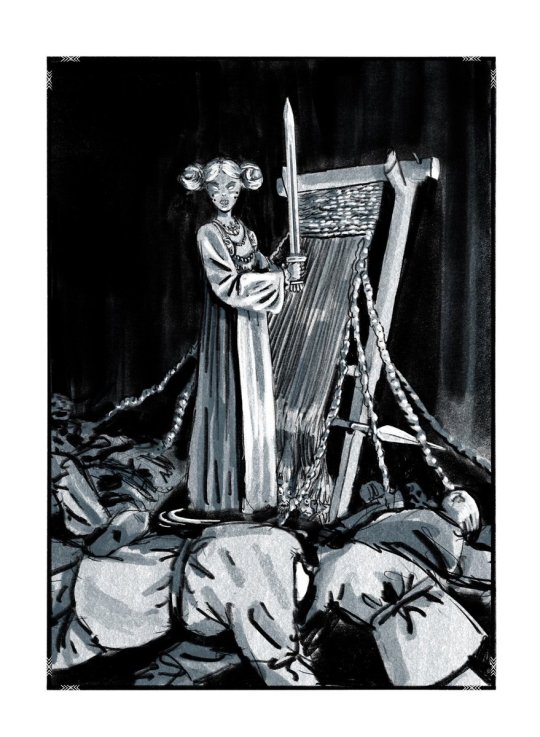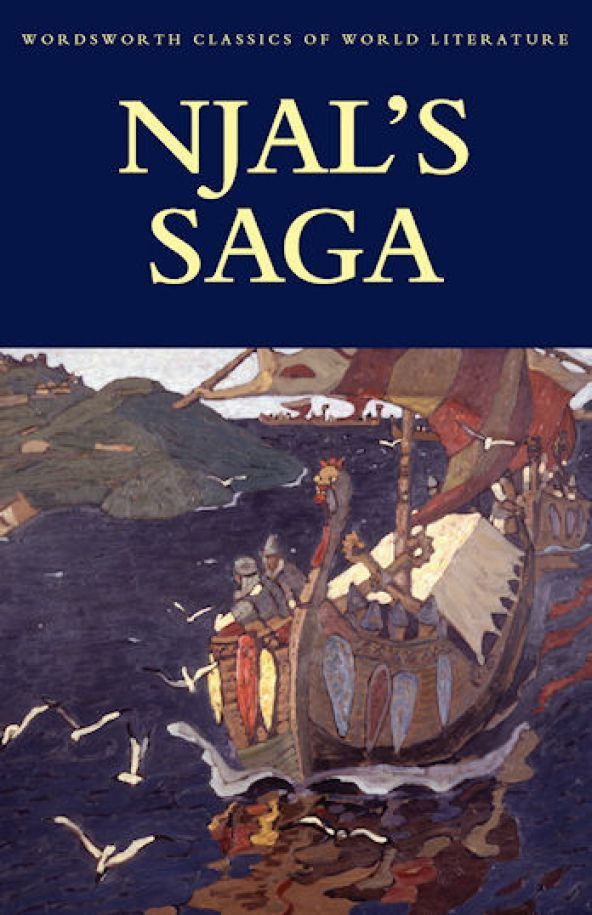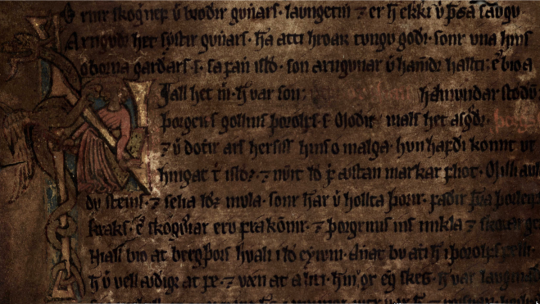#Njal's saga
Explore tagged Tumblr posts
Text
"It is said that the brave man always resists, whoever the opponents may be . . . and so shall we."
Magnus Magnusson (trans.), Njál's Saga
#Magnus Magnusson#Njal's Saga#bravery#courage#resistance#Icelandic literature#Icelandic saga#saga#quotes#quotes blog#literary quotes#literature quotes#literature#book quotes#books#words#text
4 notes
·
View notes
Text

"On Good-Friday that event happened in Caithness that a man whose name was Daurrud went out.
He saw folk riding twelve together to a bower, and there they were all lost to his sight.
He went to that bower and looked in through a window slit that was in it, and saw that there were women inside, and they had set up a loom.
Men's heads were the weights, but men's entrails were the warp and weft, a sword was the shuttle, and the reels were arrows. They sang these songs, and he learnt them by heart:
"See! warp is stretched For warriors' fall, Lo! weft in loom
'Tis wet with blood; Now fight foreboding, 'Neath friends' swift fingers, Our grey woof waxeth With war's alarms, Our warp bloodred, Our weft corseblue.
"This woof is y-woven With entrails of men, This warp is hardweighted With heads of the slain, Spears blood-besprinkled For spindles we use, Our loom ironbound, And arrows our reels; With swords for our shuttles This war-woof we work; So weave we, weird sisters, Our warwinning woof.
"Now Warwinner walketh To weave in her turn, Now Swordswinger steppeth, Now Swiftstroke, now Storm; When they speed the shuttle How spearheads shall flash! Shields crash, and helmgnawer On harness bite hard!
"Wind we, wind swiftly Our warwinning woof Woof erst for king youthful Foredoomed as his own, Forth now we will ride, Then through the ranks rushing Be busy where friends Blows blithe give and take.
"Wind we, wind swiftly Our warwinning woof, After that let us steadfastly Stand by the brave king; Then men shall mark mournful Their shields red with gore, How Swordstroke and Spearthrust Stood stout by the prince.
"Wind we, wind swiftly Our warwinning woof. When sword-bearing rovers To banners rush on, Mind, maidens, we spare not One life in the fray! We corse-choosing sisters Have charge of the slain.
"Now new-coming nations That island shall rule, Who on outlying headlands Abode ere the fight; I say that King mighty To death now is done, Now low before spearpoint That Earl bows his head.
"Soon over all Ersemen Sharp sorrow shall fall, That woe to those warriors Shall wane nevermore; Our woof now is woven. Now battlefield waste, O'er land and o'er water War tidings shall leap.
"Now surely 'tis gruesome To gaze all around. When bloodred through heaven Drives cloudrack o'er head; Air soon shall be deep hued With dying men's blood When this our spaedom Comes speedy to pass.
"So cheerily chant we Charms for the young king, Come maidens lift loudly His warwinning lay; Let him who now listens Learn well with his ears And gladden brave swordsmen With bursts of war's song.
"Now mount we our horses, Now bare we our brands, Now haste we hard, maidens, Hence far, far, away."
Then they plucked down the woof and tore it asunder, and each kept what she had hold of.
Now Daurrud goes away from the slit, and home; but they got on their steeds and rode six to the south, and the other six to the north. A like event befell Brand Gneisti's son in the Faroe Isles."
Njal's Saga - Ch 156
Art Credit: Einherjar_manga
8 notes
·
View notes
Text

19 notes
·
View notes
Text





maybe Hallgerd's husbands should stop hitting her if they hate being murdered by Thjostolf so much
#njal's saga#I love Hallgerd she has done nothing wrong#literature#also the fact that they married her off without asking her#but after Thorvald got killed they really made sure to ask her consent the next time
1 note
·
View note
Text
Icelandic law circa 965 AD is surprisingly understanding of women who want to get a divorce because their husband’s dick is too big to bring them any pleasure.
72 notes
·
View notes
Note
Hi, great page. What are some books on the Middle Ages you would recommend (no fiction please)?
Your mileage may vary depending on what about the middle ages interests you, but here are some books that I've enjoyed:
Crècy: The Battle of Five Kings by Michael Livingston (2022). It's about, you guessed it, the battle of Crecy and the events (mostly the Hundred Years War) leading up to it. Livingston has an engaging writing style. Recent publish date means the information is still reasonably accurate (I find when reading older books I will spot something I know has been disproved/updated and then I wonder how much of the rest of the book is out of date).
The Medieval Soldier by Gerry Embleton and John Howe (1995). I realize I just went on a tangent about how more recent history books are better but here me out: they use lots of quotes from primary sources, they're lots of details about everyday life I haven't been able to find elsewhere, all of the pictures are of the highest quality recreations the 90's have to offer (and that bar is honestly above plenty of current reenactment groups).
Medieval Bodies: Life and Death in the Middle Ages by Jack Hartnell (2018). Medical history, the chapters are organized by body part (if memory serves). It's been a while since I've read it, but I remember enjoying it.
26 notes
·
View notes
Text

40 notes
·
View notes
Text
Hallgerður is clearly the Vriska of Njáls saga
#liliththings#vriska#hallgerður#njals saga#homestuck#this will be the opening line of my masters thesis
4 notes
·
View notes
Text
Njal's Saga: A Medieval Best-Seller Most People Haven't Heard of
AM 133 fol. 14v (c.1300). Image courtesy of handrit.is If you want to experience a medieval Icelandic ‘family’ saga at peak performance, then this is the saga to read. Of all the sagas recounting the daily life and social settings of the ‘Viking’ world, Njal’s Saga stands out as an epic chronicle fused with both archetypal heroes and tragic social realities. But while the heroes of Njal’s Saga…

View On WordPress
#family sagas#History#iceland#icelandic#manuscript#manuscripts#medieval#middle ages#njal&039;s saga#norse#Old Norse#Resources for Literature#saga#Sagas#sagas of Icelanders#viking#vikings
3 notes
·
View notes
Text
"It is horrible now To look around, As a blood-red cloud Darkens the sky. The heavens are stained With the blood of men, As the Valkyries Sing their song."
Magnus Magnusson (trans.), Njal's Saga
#Magnus Magnusson#Njal's Saga#The Story of Burnt Njall#red sky#battlefield#Valkyries#Icelandic sagas#sagas#Icelandic literature#Nordic literature#Norse mythology#mythology#quotes#quotes blog#literary quotes#literature quotes#literature#book quotes
9 notes
·
View notes
Text
The Brennu-njals saga is like this for introducing characters. For villains, it doesn’t do foreshadowing or a turn into darkness, it goes “Valgard was a piece of shit. Unn married him against the advice of her kinsmen, and then they had a son named Mord. This guy is gonna be in the story for a long time and fuck things up for everyone, but especially for the protagonist. He’s just the worst.”
i love reading medieval literature because it will be like "here is a knight that has lived in the woods absolutely stark raving mad out of his mind eating dirt for three years. we are not unpacking all that. anyways the next day he decides to go on a journey of redemption after gaining momentary mental clarity and now he is using the stupidest moniker known to man and now he's fighting a giant." and this all happens in the span of like 50 lines.
8K notes
·
View notes
Text
ive been reading njal's saga and its really cool and good
for context njal's saga is a 13th century icelandic saga from an unknown author. ive been reading a translation from 1960, and its cool
1 note
·
View note
Text
WHAT DO YOU MEAN HILDIGUNN PICKS UP HER DEAD HUSBANDS CLOAK AND HOLDS IT TO HER CHEST WHAT THE FUCK IS UP WITH THAT
0 notes
Text
A long long time ago, in a galaxy far away, someone complained about how the young wizards fandom was fandoming. They wanted more art. So I drew "Filif and Guess Who".
I didn't mean to mock them. I meant to, ah, illustrate "well unfortunately sometimes the level of artistic ability is not to standards." But I think I might have accidentally mocked them.
On Pillowfort I have a sheep crushing a lindwurm beneath its mighty hoof.
#Nimblermortals Senf#that one was because a fellow was organizing a performance of Njal's saga and not getting enough recognition for it#so I made him what passes for an art in my world#to accompany my entrance fee#the sheep crushing the lindwurm is only marginally higher-quality
5K notes
·
View notes
